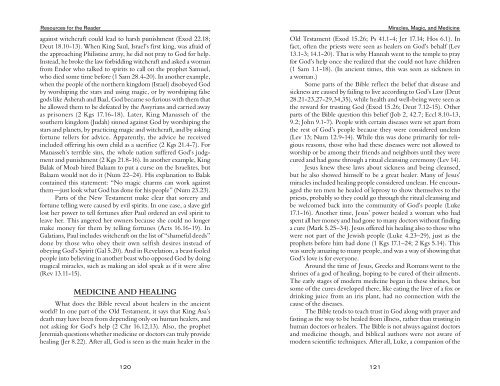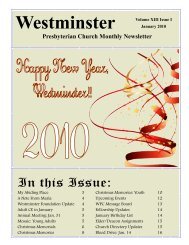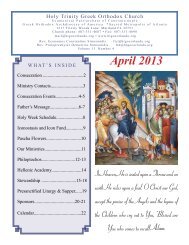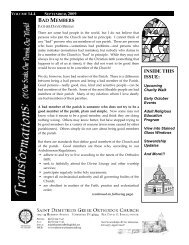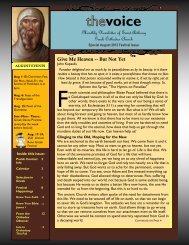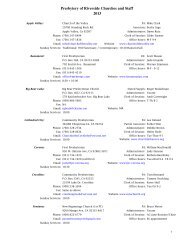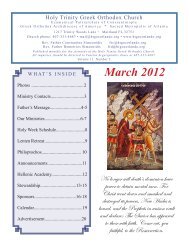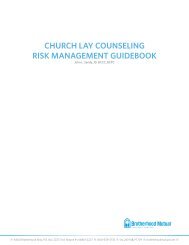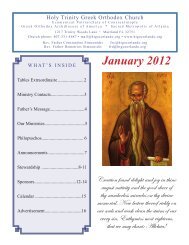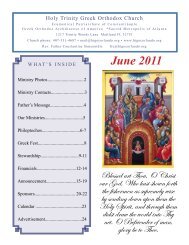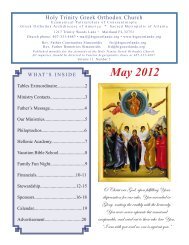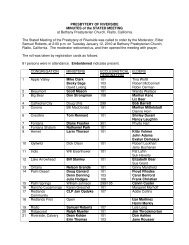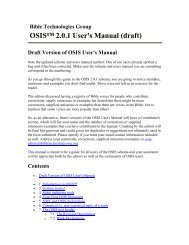The Life of the Christ - ForMinistry
The Life of the Christ - ForMinistry
The Life of the Christ - ForMinistry
Create successful ePaper yourself
Turn your PDF publications into a flip-book with our unique Google optimized e-Paper software.
Resources for <strong>the</strong> Reader<br />
against witchcraft could lead to harsh punishment (Exod 22.18;<br />
Deut 18.10-13). When King Saul, Israel’s first king, was afraid <strong>of</strong><br />
<strong>the</strong> approaching Philistine army, he did not pray to God for help.<br />
Instead, he broke <strong>the</strong> law forbidding witchcraft and asked a woman<br />
from Endor who talked to spirits to call on <strong>the</strong> prophet Samuel,<br />
who died some time before (1 Sam 28.4-20). In ano<strong>the</strong>r example,<br />
when <strong>the</strong> people <strong>of</strong> <strong>the</strong> nor<strong>the</strong>rn kingdom (Israel) disobeyed God<br />
by worshiping <strong>the</strong> stars and using magic, or by worshiping false<br />
gods like Asherah and Baal, God became so furious with <strong>the</strong>m that<br />
he allowed <strong>the</strong>m to be defeated by <strong>the</strong> Assyrians and carried away<br />
as prisoners (2 Kgs 17.16-18). Later, King Manasseh <strong>of</strong> <strong>the</strong><br />
sou<strong>the</strong>rn kingdom (Judah) sinned against God by worshiping <strong>the</strong><br />
stars and planets, by practicing magic and witchcraft, and by asking<br />
fortune tellers for advice. Apparently, <strong>the</strong> advice he received<br />
included <strong>of</strong>fering his own child as a sacrifice (2 Kgs 21.4-7). For<br />
Manasseh’s terrible sins, <strong>the</strong> whole nation suffered God’s judgment<br />
and punishment (2 Kgs 21.8-16). In ano<strong>the</strong>r example, King<br />
Balak <strong>of</strong> Moab hired Balaam to put a curse on <strong>the</strong> Israelites, but<br />
Balaam would not do it (Num 22–24). His explanation to Balak<br />
contained this statement: “No magic charms can work against<br />
<strong>the</strong>m—just look what God has done for his people” (Num 23.23).<br />
Parts <strong>of</strong> <strong>the</strong> New Testament make clear that sorcery and<br />
fortune telling were caused by evil spirits. In one case, a slave girl<br />
lost her power to tell fortunes after Paul ordered an evil spirit to<br />
leave her. This angered her owners because she could no longer<br />
make money for <strong>the</strong>m by telling fortunes (Acts 16.16-19). In<br />
Galatians, Paul includes witchcraft on <strong>the</strong> list <strong>of</strong> “shameful deeds”<br />
done by those who obey <strong>the</strong>ir own selfish desires instead <strong>of</strong><br />
obeying God’s Spirit (Gal 5.20). And in Revelation, a beast fooled<br />
people into believing in ano<strong>the</strong>r beast who opposed God by doing<br />
magical miracles, such as making an idol speak as if it were alive<br />
(Rev 13.11-15).<br />
MEDICINE AND HEALING<br />
What does <strong>the</strong> Bible reveal about healers in <strong>the</strong> ancient<br />
world? In one part <strong>of</strong> <strong>the</strong> Old Testament, it says that King Asa’s<br />
death may have been from depending only on human healers, and<br />
not asking for God’s help (2 Chr 16.12,13). Also, <strong>the</strong> prophet<br />
Jeremiah questions whe<strong>the</strong>r medicine or doctors can truly provide<br />
healing (Jer 8.22). After all, God is seen as <strong>the</strong> main healer in <strong>the</strong><br />
120<br />
121<br />
Miracles, Magic, and Medicine<br />
Old Testament (Exod 15.26; Ps 41.1-4; Jer 17.14; Hos 6.1). In<br />
fact, <strong>of</strong>ten <strong>the</strong> priests were seen as healers on God’s behalf (Lev<br />
13.1-3; 14.1-20). That is why Hannah went to <strong>the</strong> temple to pray<br />
for God’s help once she realized that she could not have children<br />
(1 Sam 1.1-18). (In ancient times, this was seen as sickness in<br />
a woman.)<br />
Some parts <strong>of</strong> <strong>the</strong> Bible reflect <strong>the</strong> belief that disease and<br />
sickness are caused by failing to live according to God’s Law (Deut<br />
28.21-23,27-29,34,35), while health and well-being were seen as<br />
<strong>the</strong> reward for trusting God (Exod 15.26; Deut 7.12-15). O<strong>the</strong>r<br />
parts <strong>of</strong> <strong>the</strong> Bible question this belief (Job 2, 42.7; Eccl 8.10-13,<br />
9.2; John 9.1-7). People with certain diseases were set apart from<br />
<strong>the</strong> rest <strong>of</strong> God’s people because <strong>the</strong>y were considered unclean<br />
(Lev 13; Num 12.9-14). While this was done primarily for religious<br />
reasons, those who had <strong>the</strong>se diseases were not allowed to<br />
worship or be among <strong>the</strong>ir friends and neighbors until <strong>the</strong>y were<br />
cured and had gone through a ritual cleansing ceremony (Lev 14).<br />
Jesus knew <strong>the</strong>se laws about sickness and being cleansed,<br />
but he also showed himself to be a great healer. Many <strong>of</strong> Jesus’<br />
miracles included healing people considered unclean. He encouraged<br />
<strong>the</strong> ten men he healed <strong>of</strong> leprosy to show <strong>the</strong>mselves to <strong>the</strong><br />
priests, probably so <strong>the</strong>y could go through <strong>the</strong> ritual cleansing and<br />
be welcomed back into <strong>the</strong> community <strong>of</strong> God’s people (Luke<br />
17.1-16). Ano<strong>the</strong>r time, Jesus’ power healed a woman who had<br />
spent all her money and had gone to many doctors without finding<br />
a cure (Mark 5.25–34). Jesus <strong>of</strong>fered his healing also to those who<br />
were not part <strong>of</strong> <strong>the</strong> Jewish people (Luke 4.23–29), just as <strong>the</strong><br />
prophets before him had done (1 Kgs 17.1–24; 2 Kgs 5.14). This<br />
was surely amazing to many people, and was a way <strong>of</strong> showing that<br />
God’s love is for everyone.<br />
Around <strong>the</strong> time <strong>of</strong> Jesus, Greeks and Romans went to <strong>the</strong><br />
shrines <strong>of</strong> a god <strong>of</strong> healing, hoping to be cured <strong>of</strong> <strong>the</strong>ir ailments.<br />
<strong>The</strong> early stages <strong>of</strong> modern medicine began in <strong>the</strong>se shrines, but<br />
some <strong>of</strong> <strong>the</strong> cures developed <strong>the</strong>re, like eating <strong>the</strong> liver <strong>of</strong> a fox or<br />
drinking juice from an iris plant, had no connection with <strong>the</strong><br />
cause <strong>of</strong> <strong>the</strong> diseases.<br />
<strong>The</strong> Bible tends to teach trust in God along with prayer and<br />
fasting as <strong>the</strong> way to be healed from illness, ra<strong>the</strong>r than trusting in<br />
human doctors or healers. <strong>The</strong> Bible is not always against doctors<br />
and medicine though, and biblical authors were not aware <strong>of</strong><br />
modern scientific techniques. After all, Luke, a companion <strong>of</strong> <strong>the</strong>


